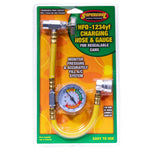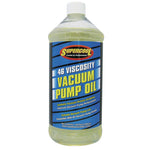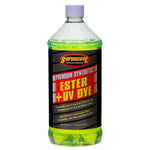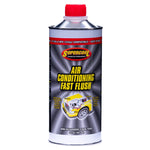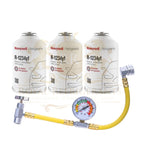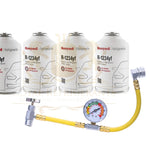You have no items in your shopping cart.
Everything You Need to Know About R428A Refrigerant for HVAC and Automotive Applications
As the HVAC and refrigeration industry continues to move away from high-global-warming and ozone-depleting refrigerants, R428A — also known by the trade name Forane® FX10 — has emerged as a replacement option for R22 and R502 systems. It offers a lower environmental impact and similar performance, making it a popular retrofit choice for older refrigeration and air-conditioning equipment.
In this article, we’ll explore what R428A is, its composition, properties, applications, and environmental impact, as well as its advantages, limitations, and modern alternatives for both HVAC and automotive systems.
What Is Refrigerant R428A?
R428A (Forane FX10) is a hydrofluorocarbon (HFC) blend developed as a non-ozone-depleting replacement for R22 and R502 in low- and medium-temperature refrigeration systems.
It’s classified as an HFC zeotropic blend, meaning it has a small temperature glide and must be charged as a liquid to maintain consistent composition.
🧪 Composition of R428A
| Component | Chemical Name | Percentage |
|---|---|---|
| R125 | Pentafluoroethane | 77% |
| R143a | 1,1,1-Trifluoroethane | 20% |
| R32 | Difluoromethane | 3% |
R428A contains no chlorine, so it has zero ozone depletion potential (ODP = 0) — a significant advantage over legacy refrigerants.
Key Properties of R428A
| Property | R428A | R22 | R502 |
|---|---|---|---|
| Type | HFC blend | HCFC | CFC blend |
| ODP | 0 | 0.05 | 0.22 |
| GWP (approx.) | 3,450 | 1,810 | 4,650 |
| Safety Classification | A1 (Non-flammable, Low Toxicity) | A1 | A1 |
| Lubricant | POE (Polyolester Oil) | Mineral/AB | Mineral/AB |
| Glide | 0.8°F | — | — |
While R428A’s GWP is relatively high, it remains a non-ozone-depleting transitional refrigerant, mainly used for retrofitting existing systems rather than new installations.

Applications of R428A
R428A is best suited for low- and medium-temperature refrigeration systems originally designed for R22 or R502. Common applications include:
- Supermarket display freezers
- Cold storage rooms and walk-in coolers
- Ice machines and vending equipment
- Transport refrigeration units
- Industrial and commercial freezers
⚠️ Note: R428A is not designed for automotive air conditioning systems. Automotive A/C systems require refrigerants like R134A, R1234yf, or R744 (CO₂) that operate under different pressures and temperatures.
Advantages of R428A
✅ Zero Ozone Depletion Potential (ODP = 0)
R428A is chlorine-free and environmentally safer compared to R22 or R502.
✅ Good Cooling Performance
Provides similar capacity and efficiency to R22 in low-temperature applications.
✅ Drop-In Retrofit Option
Minimal system modification required for R22 conversions (in most cases).
✅ Safe to Use
Non-flammable and non-toxic under ASHRAE safety group A1.
✅ Compatible with Modern Oils
Works with POE lubricants, improving reliability in compressor systems.
Limitations of R428A
❌ High Global Warming Potential (GWP)
Despite being chlorine-free, R428A has a GWP of around 3,450, making it subject to HFC phase-down regulations.
❌ Not Suitable for New Equipment
New HVAC and refrigeration systems now favor lower-GWP refrigerants such as R448A, R449A, and CO₂.
❌ Requires POE Oil Conversion
When retrofitting from R22 or R502, lubricant replacement with polyolester oil is necessary for proper oil return.
❌ Limited Availability
As regulations phase down HFCs, R428A supply is decreasing in some regions.
Pressure–Temperature Chart (R428A)
| Temperature (°F) | Pressure (PSIG) |
|---|---|
| -40 | 4 |
| -20 | 18 |
| 0 | 35 |
| 20 | 55 |
| 40 | 81 |
| 60 | 115 |
| 80 | 157 |
| 100 | 212 |
| 120 | 281 |
(Approximate values — always consult manufacturer data for accurate readings.)
Environmental Impact and Regulations
R428A complies with the Montreal Protocol because it has zero ozone depletion potential, but its high GWP places it under HFC phase-down regulations globally.
🌍 International Phase-Down:
- The Kigali Amendment (2016) mandates a gradual reduction in high-GWP HFCs, including R428A.
- Many countries now restrict the use and production of new R428A systems.
🇺🇸 United States:
- Under the EPA’s AIM Act, HFC production is being reduced by 85% by 2036.
- R428A can still be used in existing systems but not in new installations.
- Section 608 certification is required to handle, recover, or service R428A-containing systems.
🇪🇺 European Union:
- The F-Gas Regulation restricts new systems using refrigerants with GWP > 2,500.
- R428A falls above this limit and is banned for new equipment since 2020.
Modern Alternatives to R428A
| Replacement | Type | GWP | ODP | Application |
|---|---|---|---|---|
| R448A (Solstice N40) | HFO/HFC blend | 1,273 | 0 | R22 & R502 replacement |
| R449A (XP40) | HFO/HFC blend | 1,397 | 0 | Low/medium temp refrigeration |
| R452A | HFO/HFC blend | 2,140 | 0 | Transport refrigeration |
| R407F | HFC blend | 1,825 | 0 | Commercial refrigeration |
| R744 (CO₂) | Natural | 1 | 0 | New eco-friendly systems |
These replacements offer similar performance with dramatically reduced environmental impact, making them better long-term options.
Handling and Safety Guidelines
- Charge as liquid only to maintain correct blend composition.
- Use EPA-certified recovery equipment for maintenance.
- Store and transport in approved cylinders only.
- Avoid mixing with other refrigerants — it causes performance loss.
- Follow local regulations for leak detection and disposal.
Summary
| Parameter | Value |
|---|---|
| Chemical Composition | R125/R143a/R32 (77/20/3) |
| Type | HFC Blend |
| ODP | 0 |
| GWP | ~3,450 |
| Lubricant | POE Oil |
| Retrofit For | R22, R502 |
| Safety Class | A1 (Non-flammable) |
| Application | Commercial/Industrial Refrigeration |
| Phase-Out Status | Phasing down globally |
Final Thoughts
R428A refrigerant served as a valuable transitional replacement for R22 and R502, offering ozone-safe operation and reliable performance. However, due to its high GWP, it’s gradually being replaced by next-generation refrigerants like R448A, R449A, and natural refrigerants (R744, R290).
For technicians and business owners:
- Continue using reclaimed R428A for existing systems.
- Plan retrofits to low-GWP alternatives for future compliance.
- Always ensure technician certification and leak management as per EPA or regional laws.
 English
English

